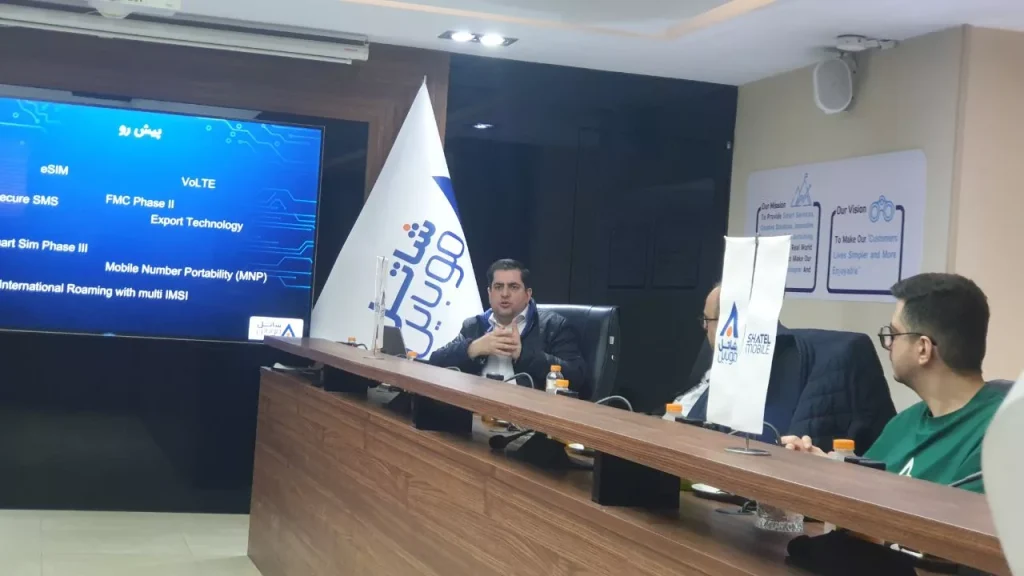
Data Tariff Suppression Suffocates the Telecom Industry, Shatel Mobile CEO says
According to Shatel Mobile CEO, Data tariff suppression and monopolies resulting from excessive support for domestic production have reduced the quality of communication services.
Arash Karimbeigi, CEO of Shatel Mobile, stated during a press conference on Saturday, April 13, 2025 (Farvardin 23, 1404) held on the occasion of the technical upgrade of the operator's smart network core, that data tariff suppression and monopolies resulting from excessive support for domestic production have reduced the quality of communication services and deprived operators of investment opportunities.
Data Tariffs Not Aligned with Inflation
Regarding the mismatch between approved data tariffs by the Regulatory Authority and inflation rates, he said: "On January 1, 2024 (Dey 11, 1402), the regulator issued permission for a 34% increase in data tariffs. However, three days later, the then Minister of Communications announced that these tariffs would not apply to domestic traffic. As a result, the announced tariff increase actually only affected about 18% of operators' revenues, which is not proportional to annual inflation."
Karimbeigi continued: "This means that after January 1, 2024 (Dey 11, 1402), we returned to the practice of data tariff suppression. From March 2024 to March 2025 (Farvardin 1403 to Farvardin 1404), we experienced more than 80% currency devaluation, and the minimum wage increased by 32% and 35% in two stages. But apparently, from the government's perspective, operators should perform photosynthesis!"
Impact on Network Quality
The CEO of Shatel Mobile emphasized: "Tariff suppression has caused operators to cut costs related to development, including coverage, new technologies, and network maintenance. This is why when the power goes out, mobile antennas also go down - meaning operators have reduced costs for supplying and updating their BTS UPS systems."
He explained: "When UPS batteries are not replaced, the development of 5G and improvement of customer experience are also affected."
Quality Expectations vs. Import Restrictions
Regarding expectations to maintain quality without import permits, the CEO of Shatel Mobile pointed to the increase in prices of modems and equipment in the monopolized market under the pretext of supporting domestic production as another challenge in the communications industry. Referring to the resulting monopoly and its impact on reducing the quality of communication services, he said: "During scheduled power outages, we receive notices demanding maintenance of quality and customer experience while continuing to support domestic production. Meanwhile, they don't issue permits for importing higher-quality foreign equipment."

Other Industry Challenges
Other challenges in the communications industry, according to Karimbeigi, include energy imbalance and power outages, human capital migration, lack of political and economic stability, domestic stagnation that has taken away operators' ability for medium- and long-term planning, as well as currency supply and transfer issues that have imposed hidden costs on operators. Another issue is filtering and lack of review of related policies, which has led to significant reduction in quality and user experience.
Sanctions Impact
Regarding international sanctions as a major challenge for the communications industry, the CEO of Shatel Mobile said: "Currently, international roaming and financial/commercial negotiations of operators face problems. In the field of eSIM, we need cooperation and interaction with GSMA and supporting vendors, which is difficult due to sanctions."
He added: "We face similar problems in providing 5G and VoLTE services. For example, Samsung, which had promised to enable 5G capability since last fall, first postponed it to January and then in writing announced April 6, 2025 (Farvardin 18, 1404) to the regulator as the new date. But now this deadline has also passed, and 5G capability on Samsung phones is still not available for many Iranian users."
In response to a question about the Communications Ministry's role in lifting sanctions, Karimbeigi said: "It seems the Communications Ministry could challenge the regulations of an American company (GSMA) by creating global consensus and influencing international forums, similar to what happened with ICANN during WSIS summits."
Content Pricing Controversy
Regarding the losses from half-priced domestic traffic tariffs and related fraud, Karimbeigi explained in response to a question about the Supreme Cyberspace Council's resolution on content regulation: "The resolution has not been published yet. Based on what we've heard, it allows elimination of half-price tariffs and anticipates tariff increases. But in return, operators must pay a percentage for producing 'premium content'."
He continued: "This essentially imposes double taxation on operators, the effect of which ultimately gets passed on to subscribers. This approach has been obsolete worldwide for years. We can't be in 2025 and still reach into people's pockets, forcing money from operators under the pretext of producing premium content."
Network Upgrade Achievements
Regarding Shatel Mobile's smart network core upgrade, Karimbeigi said: "The technical update and upgrade of Shatel Mobile's smart network core has created a new generation of intelligence and improved quality for both old and new subscribers of Shatel Mobile SIM cards, providing better network coverage, smarter network selection, higher speeds, and improved accessibility to 5G services."
He added: "Both old and new Shatel Mobile SIM cards now offer a new generation of innovative and exclusive smart SIM capabilities without needing replacement or any new settings from subscribers, automatically upgrading their experience without requiring SIM card replacement."
Karimbeigi continued: "Increased accessibility to 5G networks, higher-speed internet, better user experience, and significant improvement in communication service quality are among the results of upgrading Shatel Mobile's smart SIM core."
Shatel Mobile Growth Statistics
Regarding growth statistics, he said: "Over a 7-year period, the average annual growth rate of per capita data consumption in Shatel Mobile has been 141%, while total data consumption on the entire network has grown by 238%. The annual growth rate of voice calls has been 124%, and the annual growth rate of subscribers has been 158%."












